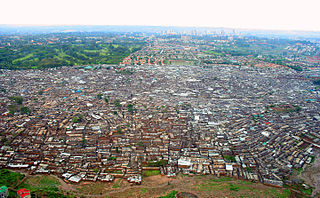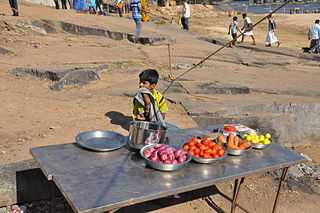A slum is a highly populated urban residential area consisting of densely packed housing units of weak build quality and often associated with poverty. The infrastructure in slums is often deteriorated or incomplete, and they are primarily inhabited by impoverished people. Although slums are usually located in urban areas, in some countries they can be located in suburban areas where housing quality is low and living conditions are poor. While slums differ in size and other characteristics, most lack reliable sanitation services, supply of clean water, reliable electricity, law enforcement, and other basic services. Slum residences vary from shanty houses to professionally built dwellings which, because of poor-quality construction or lack of basic maintenance, have deteriorated.

The United Nations Global Compact is a non-binding United Nations pact to encourage businesses and firms worldwide to adopt sustainable and socially responsible policies, and to report on their implementation. The UN Global Compact is a principle-based framework for businesses, stating ten principles in the areas of human rights, labor, the environment and anti-corruption. Under the Global Compact, companies are brought together with UN agencies, labor groups and civil society. Cities can join the Global Compact through the Cities Programme.

Kibera is a division of Nairobi Area, Kenya, and neighbourhood of the city of Nairobi, 6.6 kilometres (4.1 mi) from the city centre. Kibera is the largest slum in Nairobi, and the largest urban slum in Africa. The 2009 Kenya Population and Housing Census reports Kibera's population as 170,070, contrary to previous estimates of one or two million people. Other sources suggest the total Kibera population may be 500,000 to well over 1,000,000 depending on which slums are included in defining Kibera.

The United Nations Human Settlements Programme (UN-Habitat) is the United Nations programme for human settlements and sustainable urban development. It was established in 1978 as an outcome of the first United Nations Conference on Human Settlements and Sustainable Urban Development held in Vancouver, Canada, in 1976. UN-Habitat maintains its headquarters at the United Nations Office at Nairobi, Kenya. It is mandated by the United Nations General Assembly to promote socially and environmentally sustainable towns and cities with the goal of providing adequate shelter for all. It is a member of the United Nations Development Group. The mandate of UN-Habitat derives from the Habitat Agenda, adopted by the United Nations Conference on Human Settlements in Istanbul, Turkey, in 1996. The twin goals of the Habitat Agenda are adequate shelter for all and the development of sustainable human settlements in an urbanizing world.

The term ethical trade first gained currency in the mid-1990s, where it was used as a term for socially responsible sourcing. Ethical trade addresses the ethical aspects of organisations including worker welfare, agricultural practice, natural resource conservation, and sustainability of the environment. Since then, numerous multinational organisations have adopted ethical trade policies by outsourcing to auditing companies to monitor the conditions of workers in their supply chains. The leading alliance of these companies, trade unions and non-governmental organisations is the Ethical Trading Initiative. to support business

The International Trade Centre (ITC) is a multilateral agency which has a joint mandate with the World Trade Organization (WTO) and the United Nations (UN) through the United Nations Conference on Trade and Development (UNCTAD).
Alliance for a Green Revolution in Africa (AGRA) is an organisation that seeks to transform African agriculture from a subsistence model to strong businesses that improve the livelihoods of the continent’s farming households.
Sustainability standards and certifications are voluntary guidelines used by producers, manufacturers, traders, retailers, and service providers to demonstrate their commitment to good environmental, social, ethical, and food safety practices. There are over 400 such standards across the world.

Circles of Sustainability is a method for understanding and assessing sustainability, and for managing projects directed towards socially sustainable outcomes. It is intended to handle 'seemingly intractable problems' such as outlined in sustainable development debates. The method is mostly used for cities and urban settlements. This project was abandoned in 2019 and many of the references including the projects website no longer exists.
Multistakeholder governance is a practice of governance that employs bringing multiple stakeholders together to participate in dialogue, decision making, and implementation of responses to jointly perceived problems. The principle behind such a structure is that if enough input is provided by multiple types of actors involved in a question, the eventual consensual decision gains more legitimacy, and can be more effectively implemented than a traditional state-based response. While the evolution of multistakeholder governance is occurring principally at the international level, public-private partnerships (PPPs) are domestic analogues.

The Union for Ethical BioTrade (UEBT) is a nonprofit association that promotes the "Sourcing with Respect" of ingredients that come from biodiversity. Members commit to gradually ensuring that their sourcing practices promote the conservation of biodiversity, respect traditional knowledge and assure the equitable sharing of benefits all along the supply chain, following the Ethical BioTrade Standard. Members also commit to the UEBT verification system, which includes undergoing independent third party verification against the Ethical BioTrade Standard, developing a work-plan for gradual compliance for all natural, as well as the commitment to continuous improvement once compliance is achieved.

Cities Alliance is a global partnership fighting urban poverty and supporting cities to deliver sustainable development. To manage its activities, the Cities Alliance operates a multi-donor fund with UN Office for Project Services (UNOPS), as host and trustee. Different members provide direction, financing and advocacy. Cities Alliance aims to deliver solutions to urban poverty.
Studio One Eighty Nine is a fashion social enterprise based in Ghana and the United States. Its goal is to promote African and African-inspired fashion. It has its own label and supports other brands. Studio One Eighty Nine co-founders, Hollywood actress Rosario Dawson and former Bottega Veneta communications executive Abrima Erwiah, created Fashion Rising in 2013 in honor of V-Day Movement's One Billion Rising campaign.
Tereneh (Mosley) Idia is a Pittsburgh-raised and internationally based fashion designer and the founder of Idia'Dega. Her work has been featured in Martha Stewart Weddings, Afropunk, Super.selected, El Pais online, Oreeko, Chaos Fashion Magazine, and the Pittsburgh Post-Gazette.
Stella Novarino, known professionally as Stella Jean, is an Italian fashion designer of partial Haitian origin. She is a member of the Italian Chamber of Fashion and the only member of Afro-European background. Living and working in Rome, Jean is considered to be Giorgio Armani's protégé.
Slow fashion is a concept describing the opposite to fast fashion and part of the "slow movement", which advocates for manufacturing in respect to people, environment and animals. As such, contrary to industrial fashion practices, slow fashion involves local artisans and the use of eco-friendly materials, with the goal of preserving crafts and the environment and, ultimately, provide value to both consumers and producers.

Vanessa Erogbogbo is a private sector development specialist with a focus on trade, sustainability and gender. She is the Chief of the Sustainable and Inclusive Value Chains Section and Head of the SheTrades Initiative at the International Trade Centre (ITC).
Ilaria Venturini Fendi is an Italian fashion designer and entrepreneur.

Dorothy (Ng’ambi) Tembo is a Zambian economist and trade and development expert. She is the deputy executive director of the International Trade Centre (ITC), a joint agency of the United Nations and the World Trade Organization.
Roberta Annan is a Ghanaian businesswoman and the founder of the African Fashion Foundation. She is also an investor, philanthropist, and a United Nations Environment Programme Goodwill Ambassador. Annan was the youngest African to be inducted into the African Leadership Hall of Fame. A graduate of Carleton University and Georgetown University, Annan began her career with an internship at the U.N. headquarters in New York City. Annan is the owner of Annan Capital Partners, an investment company in Sub-Saharan Africa, and ALDG, a portfolio of assets in sustainable hospitality, agribusiness, and sustainable luxury in Africa.










